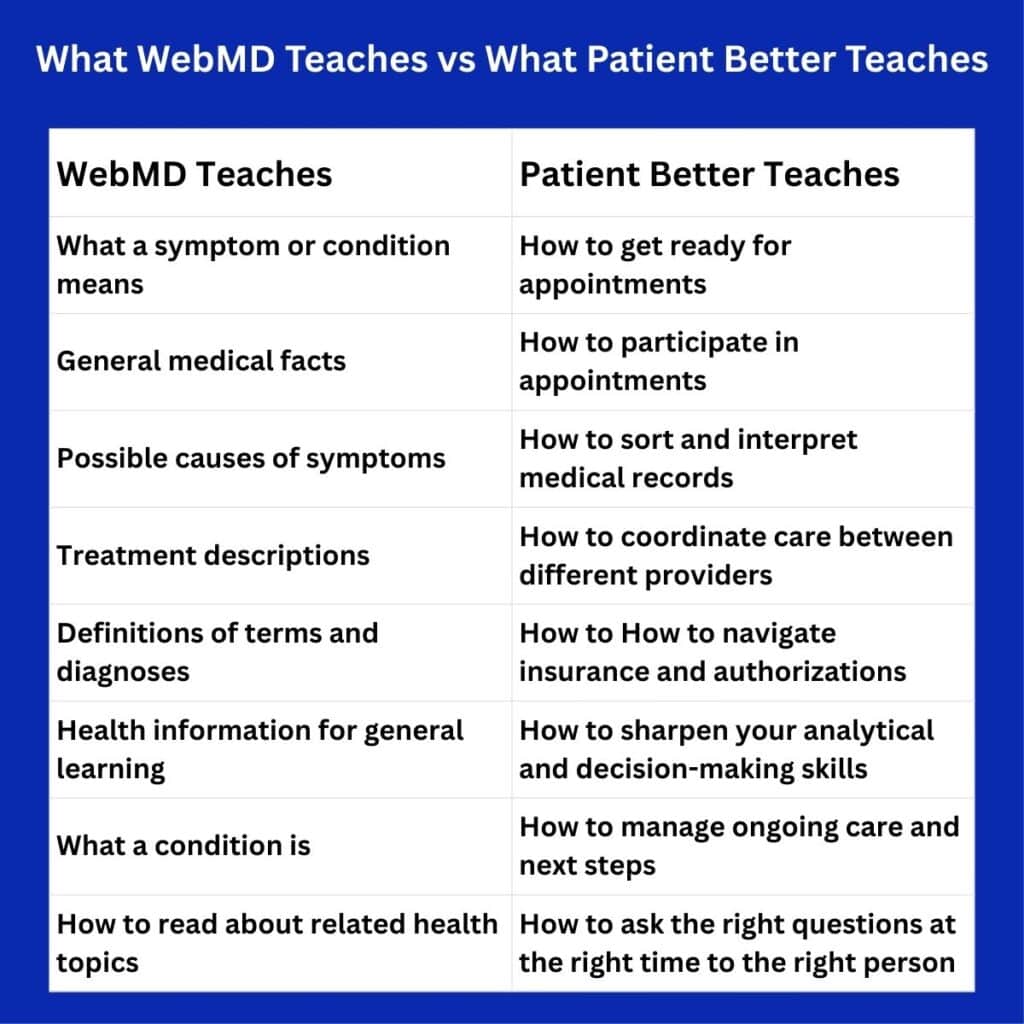Patient Better vs WebMD: Why Today’s Healthcare System Requires Education, Not Just Information

Some people learn best by listening — if that’s you, press play!
Modern healthcare asks patients to do far more than understand medical facts. It asks them to organize records, communicate clearly, coordinate appointments, manage insurance, track medications, and make decisions in a system that moves quickly and often feels disjointed. This article explains the Patient Better vs WebMD difference and why patients today need navigation skills—not just information—to manage their care confidently.
Why Information Alone Isn’t Enough Anymore
Ten years ago, medical websites were the answer most people turned to when they needed clarity about a condition, symptom, or treatment. WebMD, Healthline, MedlinePlus, and even resources from the National Library of Medicine continue to deliver valuable health information. But the healthcare landscape has changed dramatically.
Patients now carry more administrative responsibility than ever before. Appointments are shorter. Systems are fragmented. Insurance rules are more complex. And decisions happen fast. People don’t just need facts—they need a way to use them in real life.
That’s where the break between WebMD and Patient Better becomes clear.
Patient Better vs WebMD: The Real Difference
WebMD provides explanations, definitions, and medical context.
Patient Better teaches how to navigate that information, apply it, document it, and use it to move through the system without feeling lost.
This difference is especially important now because navigation skills have become essential for avoiding care delays, improving communication, reducing mistakes, and managing chronic conditions in a system with more moving parts than ever.
What WebMD Teaches vs What Patient Better Teaches
As the care delivery landscape grows more complex, people need more than medical facts—they need education to navigate the healthcare system. This is exactly why Patient Better was created to fill this growing gap.

Patients Also Ask
Below are a few common questions patients ask when comparing Patient Better vs WebMD so you can quickly understand how each option supports your healthcare needs today.
What is the main difference between Patient Better and WebMD?
The main difference is that WebMD provides medical information, while Patient Better teaches people how to navigate, coordinate, and manage their care. One is informational; the other is educational and skill-building.
Why does the Patient Better vs WebMD comparison matter today?
It matters today because healthcare has become more complex, more digital, and more fragmented. Modern patients need navigation and coordination skills to use their care effectively, something WebMD cannot teach and Patient Better was built to deliver.
Can Patient Better help me prepare for appointments in ways WebMD cannot?
Yes. Patient Better shows you how to organize your questions, documents, and medical history so you get more out of every visit. WebMD can explain conditions, but it cannot teach you how to communicate or manage the administrative side of your care.
Is Patient Better useful for health plans and clinicians as well as consumers?
Yes. Patient Better provides measurable engagement tools that support health plans and licensed healthcare professionals. At the same time, it gives consumers the skills they need to navigate their benefits, coordinate care, and avoid unnecessary errors.
Why This Matters for Your Health Today
When patients don’t know how to manage their own information, insurance, or communication, even the best medical facts won’t help them move forward. This is why health navigation skills, care coordination education, patient engagement tools, and digital health literacy have become essential parts of modern health management.
Healthcare literacy isn’t just about understanding conditions. It’s about knowing what to do next—and how to do it correctly.
How Patient Better Helps You Use Information the Right Way
Patient Better is designed to bridge the gap between information and action. It helps readers:
- translate medical information into daily decisions
- stay organized with records and paperwork
- prepare effectively for appointments
- communicate clearly with clinicians
- coordinate care across different providers
- understand insurance basics and avoid financial surprises
- prevent unnecessary errors or delays
This is why many health plans and healthcare professionals also rely on Patient Better as a tool for improving engagement and quality scores—and why patients feel more in control when they use it.
Smart Questions That Strengthen Your Healthcare Journey
Ask yourself these signpost questions before you begin your next round of healthcare research or preparation. They help you focus on what matters and guide your next steps:
- What do I need to learn today that will help me better manage my health or my care? People ask this when they feel overwhelmed and want to focus their energy on learning something that will make an immediate difference in their daily health or decision-making.
- What questions should I be asking before my next appointment so I feel more confident and prepared? This matters because appointments are short, and going in with the right questions helps patients get clearer answers, avoid confusion, and leave with a plan they can actually follow.
- What part of my care feels unclear or confusing, and what information do I need to focus on to improve that? Patients ask this when they’re trying to untangle what’s causing frustration—whether it’s a diagnosis, test results, insurance rules, or instructions—so they know exactly where to direct their attention.
- What is the most important thing I need to organize—my records, my medications, my insurance, or my upcoming decisions? This helps people identify their biggest barrier so they can prioritize the task that will bring the most clarity and reduce the most stress.
- What action do I want to take after reading this information, and what steps will help me follow through on it? People ask this to move from passive learning to real progress, making sure they turn information into practical steps that support better outcomes.
These questions move you from reading to doing—and that shift is where true healthcare improvement begins.
Final Thoughts
The comparison of patient better vs webmd is not a competition. WebMD offers valuable information. Patient Better provides the education and structure people need to actually navigate and truly participate in their care. Together, they serve different roles—but only one prepares patients to move through today’s healthcare system with confidence.
If you want to explore a reliable source of medical information alongside Patient Better’s navigation tools, you can visit WebMD.
Do you want to discuss your score?
Disclaimer: This education was brought to you today by The Patient Better Project Inc., a 501(c)(3) organization dedicated to reshaping the way patients and caregivers navigate care. We are committed to empowering individuals with the knowledge and tools necessary to take control of their health journeys, ensuring that everyone can access the care they need with confidence and clarity.
The information provided here is for educational and entertainment purposes only. It is not intended as, nor should it be considered a substitute for professional medical advice, diagnosis, or treatment. Always seek the advice of your physician or other qualified health provider with any questions you may have regarding a medical condition. If you think you may have a medical emergency, immediately call 911 or your local emergency number.